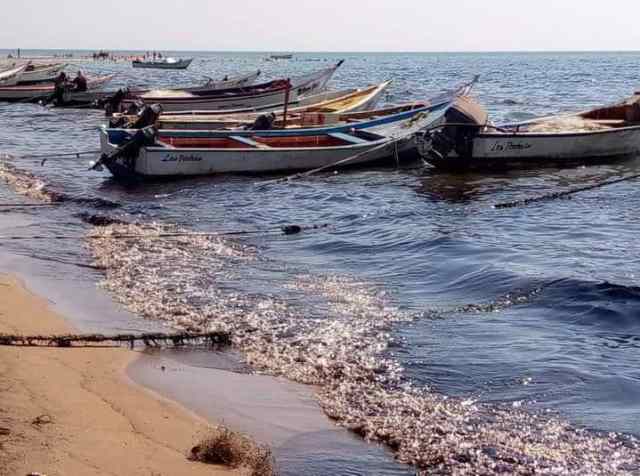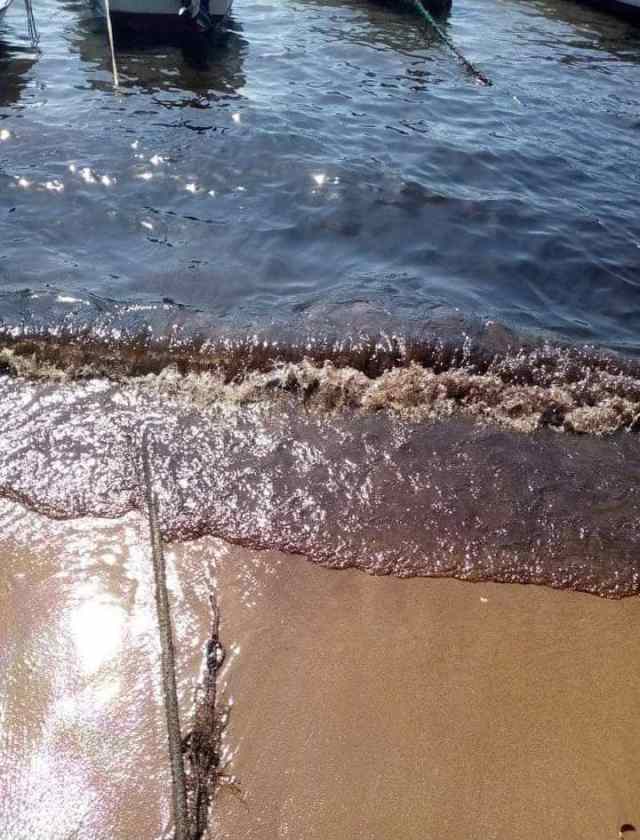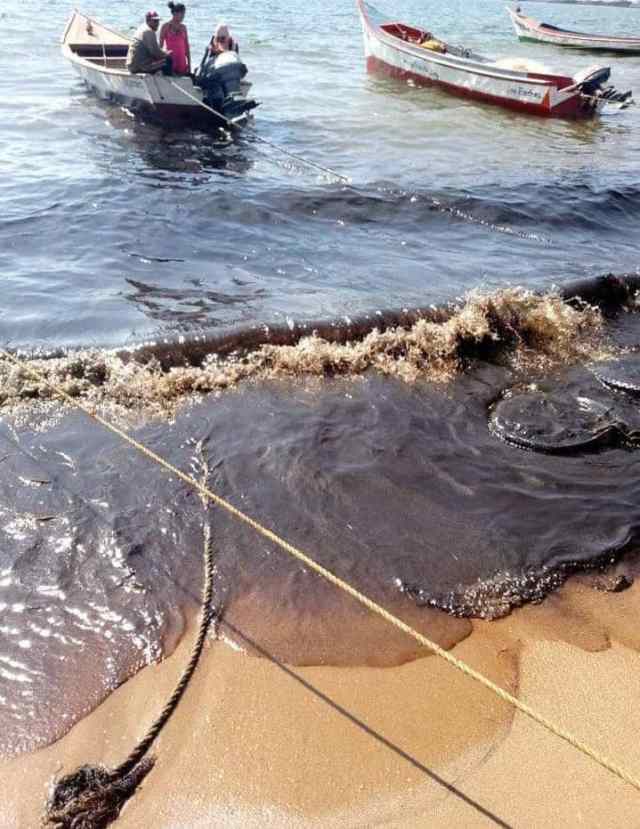
The crude oil that has been contaminating the waters of the ‘Golfete de Coro’ in Falcón State since last August, caused by a leak in the underwater pipeline that goes to the Paraguaná Refining Complex (CRP), has already reached the shores of Punta Cardón and Tiguadare in Carirubana Municipality, and contaminated the surrounding areas. The water looks black, as does the sand, part of the boats and even the fishermen’s fishing nets.
By Irene Revilla / Correspondent lapatilla.com
Residents of the affected areas reported that the situation is going from bad to worse and although they have called PDVSA, it has not responded to any request until this Saturday, September 16th, when they sent the team to inspect the area and determine the repairs that must be made. Fishermen have recorded more than 38 oil and gas spills since November 2019.
There are currently two active oil spills very close to the coast of Tiguadare, and two gas spills, one of them ongoing since January of this year. Although PDVSA has patched the pipeline where the leaks occur, each repair lasts about 15 days and the area is never cleaned. This has caused the disappearance of the marine species that the fishermen of the coastal area of Paraguaná and Golfete de Coro depend on for their living.
This September 16th, the damage seems irreparable, the boats stained with crude oil, as well as the fishing nets and the most worrying thing is that every day the Golfete becomes more polluted and nothing is done to recover or protect it, even though it is a environmental reservoir full of mangroves that houses migratory birds all year round, and is also the main source of work for the inhabitants of the entire coastal area.

The Minister of Fisheries visited the state of Falcón in July 2022 and met with the different fishermen’s councils who requested the cleanup of the Golfete, the cleaning and dredging that was never completed by the companies that installed the underwater gas and water pipelines. At least the most recent, as well as other benefits for fishermen and their families, even the Minister of Petroleum, Pedro Tellechea, made an overflight in the golfete in June of this year and “activated” a “rescue committee” for the area, this as part of action of a plan in conjunction with the State institutions framed in the “Green Oil” plan.
According to a PDVSA press release, located on its website, among the first actions is the replacement of pipelines 1 and 2 that run for over 23 kilometers of seabed and that transport the crude oil that is processed in the CRP. As a second action, Community Spill Response Brigades would be formed where oil workers would participate in addition to the community to immediately attend to any spill in the area. Although these are two essential actions to stop contamination, this has not been done yet.
The fishermen sent a statement to LaPatilla, moved by the terrible situation that the Golfete is going through and that nothing has been done to repair the damage. Although requests have been made on countless occasions to clean up the area, protect marine fauna and flora, as well as close the underwater lines that are in such poor condition, the requests raised have been ignored.
LaPatilla consulted with specialists in the area who are active in the oil industry and they confirmed that the pipelines have not had preventive maintenance for about 15 years, they are also very deteriorated, when a leak is repaired and another immediately appears, so what is most appropriate is to fully replace it in sections and although it is planned to do so, it is a very expensive project.
Marine biologist and university professor, Eduardo Klein, keeps records of all oil and gas spills through satellite images and has observed rivers of oil running through the sea since the beginning of August. According to his record, there is a gas leak that has been contaminating the area since January of this year, that is, nine months and puts all the fishermen who pass through the area at risk. “With the slightest spark, we all explode,” says a fisherman in a video they recorded from near the leak.
The Venezuelan Observatory for Environmental Human Rights (Ovedha) published its report in early January on the situation of oil spills in Venezuela during the second half of 2022, explaining that 35 accidents of this type were recorded in the country, for a total of 80 throughout the year. The report indicates that 83% of the spills were concentrated in the states of Zulia, Anzoátegui and Falcón.
These spills have directly affected some 5,000 families from the state of Falcón who fish in the area, so they have had to migrate to other areas, putting their lives at risk because the boats are not designed to go that far, in addition to the use of more fuel. , they become the target of sea pirates and a forced migration to other areas is generated that ends up affecting the entire family of each fisherman.

What is the Golfete de Coro and why is it so important?
The Golfete de Coro is a coastal indentation between two capes or headlands, larger than a cove, but smaller than a gulf. It is located between the western coast of the Falconian sea coast itself and the isthmus of the dunes, between Puntas Cardón and Maragüey in northwestern Venezuela. Within it are large wetlands which are designated as a unique biological reserve that also serves as a refuge for global migratory birds.
The seabed of this important water body is crossed by gas and oil pipelines that carry crude oil and natural gas from the state of Zulia to the Amuay and Cardón refineries, and the Cardón IV mixed company, which produces and exports gas.
These areas receive many shorebirds of various species, which arrive to the place with the purpose of replenishing nutrients and energy to continue the annual migration journey. These are wetlands of utmost importance for the environment and artisanal shrimp fishing. However, PDVSA has not complied with the internationally required protocols to protect this ecosystem.

